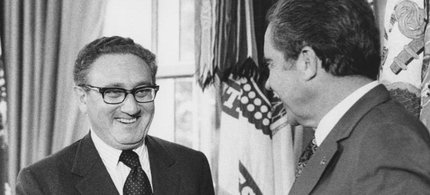
WIKILEAKS DUMPS 1.4 MILLION 'KISSINGER CABLES'
Natasha Lennard, Salon

Henry Kissinger (left) meets with Richard Nixon. (photo: unknown
WikiLeaks releases 1.7 million archived records from 1970's shedding light on global diplomatic history.
 pdated, 10:35 a.m.: News organizations around the world who have partnered with Wikileaks over the Kissinger Cables are already digging up a number of significant stories.
pdated, 10:35 a.m.: News organizations around the world who have partnered with Wikileaks over the Kissinger Cables are already digging up a number of significant stories.
The late Indian Prime Minister Rajiv Ghandi may have been a middleman for an arms deal in the 1970s, according to diplomatic cables searched by The Hindu newspaper. Gandhi was employed by Swedish group Saab-Scania to help sell its Viggen fighter jet reportedly because of access to his mother Indira Ghandi - prime minister at the time. In his press conference Monday, Julian Assange said this revelation is shaking Indian politics, as the Ghandi family still dominates India's ruling party.
Meanwhile, one cable dated October 18, 1973 sent to Washington by the US embassy to the Vatican reveals that the Vatican once dismissed reports of massacres by Chilean dictator Augusto Pinochet as "Communist propaganda."
Updated, 9:56 a.m.: Assange compares the Kissinger Cables to "essentially like what Aaron Swartz was doing" - namely collating documents which are hard to access, or available only through a specific intermediary.
I'm not convinced it's an entirely appropriate comparison - above all since Swartz never made public the JSTOR documents he downloaded.
Updated, 9:30 a.m.: In a D.C. press conference, Julian Assange is discussing the latest cable leak via video link from his London hideout. He is highlighting a number of significant stories that have emerged from the 1970's records relating to diplomatic relations world wide.
Examples include the U.S. creating a "torture exemption" for the Brazilian military junta in order to send them aid, despite widespread use of torture that should have excluded the country from U.S. aid at the time.
Praising the searchable collection of records, named the Public Library of U.S. Diplomacy, or PLUSD, Assange said the new WikiLeaks product is "like a source you can interview again and again."
Assange (wearing a particularly unusual guru-style short) explained the impetus of making previously difficult to access archived records readily available: "The U.S. administration cannot be trusted with its control of the past."
Original post: WikiLeaks late Sunday published the world's largest searchable collection of U.S. confidential, or formerly confidential, diplomatic communications. The over 1.7 million records released were not leaked by a whistleblower. Rather, the documents, dating from between 1973 to 1976, were obtained from the National Archives and Record Administration (NARA) and collated through a year's painstaking work into a digital format for public access.
Of the million-plus records, 205,901 are connected to U.S. Secretary of State Henry Kissinger, who is the author of many of the cables. A WikiLeaks statement said the cables contained "significant revelations about U.S. involvements with fascist dictatorships, particularly in Latin America, under Franco's Spain (including about the Spanish royal family) and in Greece under the regime of the Colonels." As such, the documents - which the U.S. government has made repeated efforts to reclassify - could shed led light on previously shrouded aspects of U.S. history. "While several of these documents have been used by U.S. academic researchers in the past, the Kissinger Cables provides unparalleled access to journalists and the general public," a statement from the leaks site noted.
In an early teaser of the documents' contents, WikiLeaks drew attention to a chilling comment made by Kissinger in 1975 during a conversation with the then-U.S. ambassador to Turkey and two Turkish and Cypriot diplomats. Kissinger quipped: "Before the Freedom of Information Act, I used to say at meetings, 'The illegal we do immediately; the unconstitutional takes a little longer.' [laughter] But since the Freedom of Information Act, I'm afraid to say things like that."
Controversial WikiLeaks publisher Julian Assange, confined to the Ecuadorian embassy in London since last June after losing legal attempts to avoid extradition to Sweden, stated of his organization's newest release: "The collection covers U.S. involvements in, and diplomatic or intelligence reporting on, every country on Earth. It is the single most significant body of geopolitical material ever published."
We will continue to update this post as more information about the leak and significant details from the cables' content come to light.
